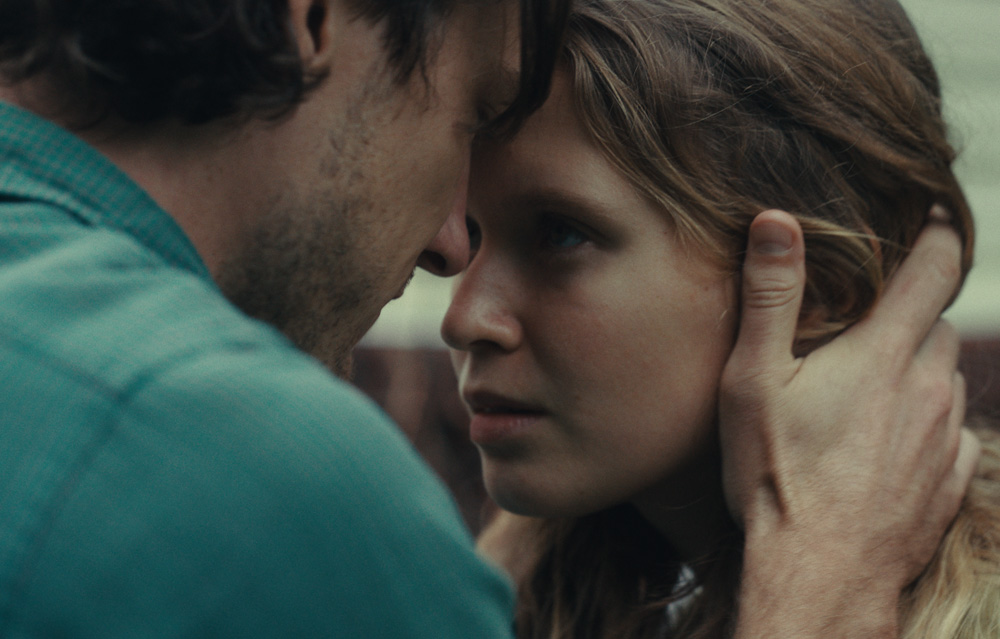There’s a little more than a pinch of irony in the fact that Jem (Eliza Scanlen) lets the air of the tires of her bike to score a ride home with her youth pastor Owen (Lewis Pullman) in “The Starling Girl” when it seems the experience will only be deflating for her ultimately. They’ve known each other for some time having been a part of the same fundamentalist Christian flock in Kentucky where Owen’s father Pastor Taylor (Kyle Secor) runs the roost, but something’s changed in Owen since returning from a mission in Puerto Rico as it has for Jem, now 17 and feeling her oats, only seeming to be able to express herself in the church’s dance group while Owen starts a small garden to return abroad in spirit when packing his bags doesn’t seem like an option with his commitments at home.
The relationship that starts to form between the two in “The Starling Girl” is inappropriate to be sure, but writer/director Laurel Parmet suggests no more so than the others that the two have been individually forced into because of their faith, with each drawn to one another for the reason of wanting something a little more out of life as any other. In the electrifying drama, Jem and Owen may start planning covert excursions to the local lake at night, but they reveal the world around them where Jem’s father Paul (Jimmi Simpson), a former touring musician, found stability in settling down with his devout wife Heidi (Wrenn Schmidt), but not necessarily a sense of peace, and Ben (Austin Abrams), the other Taylor boy who Jem has been promised to in marriage, looks about as uncomfortable about the prospect of a union as she does.
Filmed tenderly in the bluegrass state where the emerald fields seem to be concealing a darkness, “The Starling Girl” shows an uncommonly deep compassion for all involved and how they’re shaped by the situation they’ve been drawn into, with the film’s star Scanlen continuing to make the case that she’s the most gifted actress of her generation following her striking turn in “Babyteeth” and Pullman matching her beat for beat. It’s an extraordinary feature debut for Parmet, whose time has been coming since her arresting shorts “Spring” and “Kira Burning” were standouts on the festival circuit, and on the eve of the release of “The Starling Girl,” she spoke of how she managed to find exactly the right tone to depict such a complex relationship on screen, her joy of working with actors and finding a savvy solution to getting all the music she wanted in the film with the help of her friends.
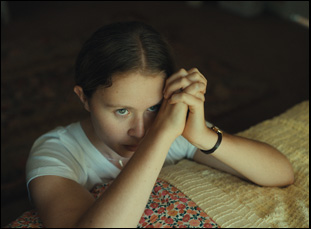
I had a similar relationship when I was a teenager with an older man, and I didn’t see myself as a victim at the time. I felt like I had agency and was mature enough, but it wasn’t until years later that I started to realize how much guilt I had about the relationship and a lot of that recognition came from my time with women in a patriarchal church in Oklahoma, learning about their beliefs that it’s a woman’s responsibility to not lead a man into temptation and that their bodies really aren’t their own, that they belong to men and to God, essentially. My immediate response to that was, “Oh my God, it’s so backwards,” but then I recognized how similar our experiences actually are, just in terms of like what our culture teaches us about female desire and our bodies and how we have to seek self-worth in men. So I decided that I wanted to tell a story looking back at my experiences and set it in this world that is incredibly specific, but ultimately a reflection of our own world.
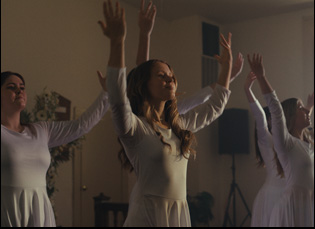
Yeah, they’re really reflections of each other, and his character came into the mix initially because I didn’t want to just focus on the female experience in these communities. I wanted to show how patriarchal systems are harmful to everyone, not just women and her father is really having similar struggles that Jem is having. He can’t reconcile his faith with his individual self-expression and his love of music. He feels like he can’t have both. It has to be one or the other, and Jem is having this similar crisis where she loves expressing herself through dance. But she feels like if she enjoys dance too much, then that means that she isn’t honoring God and over the course of the film, she is able to see “Well, maybe I can have both. Maybe enjoying dancing and connecting with my body and movement is honoring God ultimately,” so Jem being able to look at her father’s struggles helps her to realize that.
It surprised me to learn that you originally had plans to shoot in Oklahoma when Kentucky seems so fertile for this. What was it like to let the physical landscape play into this?
It was amazing. As soon as I scouted Kentucky, I knew I wanted to shoot there. It’s just so incredibly lush and green and beautiful, and it’s dreamy in a lot of ways. I thought it would be helpful to echo Jem’s inner life when she’s getting swept up in this romance, and she’s experiencing this opening up and something that’s very exciting and beautiful, but also fucked up at the same time and Kentucky really helped to create that feeling of possibility and romance. And there [ended up] being thunderstorms all the time that shut down our production. It was incredibly hot and sweaty and the air was heavy and thick, [with] bugs everywhere, but that only led to more of that textured feeling that we were going for — to help the audience feel like they were really there with Jem and added to the vivid immediacy.
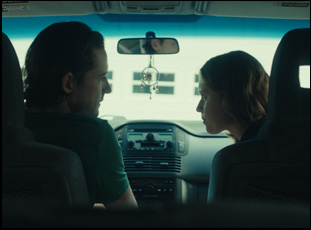
Yeah, I love to be surprised in casting. That’s something I always strive for. And with Lewis [Pullman], a lot of audiences know him as this lovable dork from a lot of the films that he’s in. In “Top Gun,” he’s Dorky Bob, the only guy who doesn’t take his shirt off at the beach, but you meet Lewis in person, and he is so charismatic and charming and magnetic and also incredibly gentle, which was important to this character. I didn’t want Owen to be immediately threatening. I wanted the audience to understand why Jen would fall for him and Lewis definitely helps bring that to the character. And Jimmi [Simpson] was another surprising one. We’re used to seeing him either be really silly or twisted and messed up. In “House of Cards,” he’s such a dark character, so it was exciting to get to see him play a dad and have this nurturing side to him. Obviously [the character] has a lot of demons, which he did a wonderful job portraying, but this was a character who could be one-dimensional and harsh, like a troubled alcoholic dad, Jimmi added a different, softer side to him, so making unexpected choices like that helps to flesh these characters out and make sure that they don’t become caricatures.
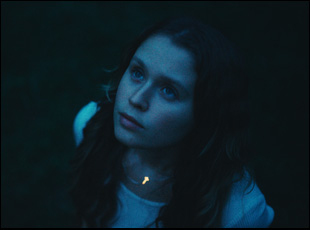
It was just pure joy watching Eliza [Scanlen] and Lewis together for the first time and seeing how we all work together. They’re such talented actors and wonderful collaborators, and it was so fun figuring out [how] to navigate this delicate tightrope where we’re showing a relationship where the audience has to believe that these two characters are falling in love and are getting swept up in this thing, but at the same time, wanting to convey that it’s problematic. We would have to figure out these scenes where at the beginning of the scene, maybe you’re sort of rooting for their relationship and then by the end, you’re like, “Oh God, wait, why did I want that?” You have to be very calculated in figuring out those beats and where you want the audience to feel certain things, so that was so fun figuring that out with them.
Was that ultimately tricky to navigate back in the editing room as well?
No, it wasn’t tricky, that was fun. I knew that I was going to need a lot of flexibility because things can always change, depending on what scenes get cut and how the film cuts together, even small things like score. I didn’t want to lock us into one thing, and I wanted to have the flexibility to change these dials and to manipulate when we wanted the audience to feel certain things. When we were shooting, I had Louis, especially, try something different with each take and shift the intention a little bit, so we were able to really craft the scenes in the editing room.
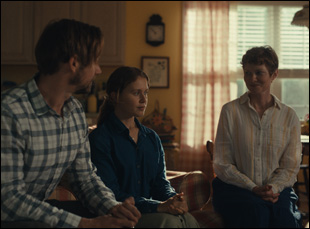
Once we were going, we were a working machine and it’s silly to say this, but I didn’t get that stressed out. I was surprised by how calm I felt throughout the process of shooting, even though obviously, indie filmmaking especially can be very stressful, but it was just such a joy being on the set and working with my wonderful cast and crew. I just loved every moment of it and felt like I was doing what I was supposed to be doing. Even when things went wrong, I always had this feeling we’ll figure it out in the end.
It’s so accomplished that doesn’t surprise me. I do hear that you might’ve had a wrench thrown into your music plans when you thought the rights may be too pricey for certain tracks, but you came up with a novel solution. What was it like to figure out?
It’s two hymns in the film – the first is one of the opening scenes where the girls are performing in church and then later when Jem is driving her family home and there’s a hymn, “Were You There” playing on the radio and I was in a band in high school and two of those people are still some of my best friends. We play music together for fun, so I knew that when it was going to be hard to get the rights to those songs, I [thought], “Oh, we’ll just do it ourselves. We love to harmonize and sing together, so that’ll be another part of myself to bring into the film that will be fun.” And I also always just want to feel like I’m making movies with my friends and this was just one other element of feeling like that.
“The Starling Girl” opens on May 12th in Los Angeles at the AMC Century City and New York at the Angelika Film Center, the AMC Lincoln Square and the Alamo Drafthouse Brooklyn before expanding on May 19th. A full list of theaters and dates is here.




